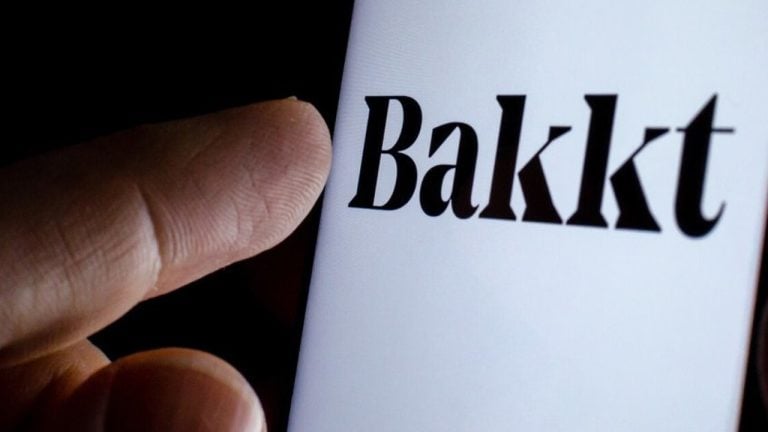 Bakkt Holdings Inc. announced Monday that it will solely focus on business-to-business technology solutions and discontinue its consumer application. The company stated that the app will officially be discontinued on March 16, 2023, and app users will continue to have access to all of their assets. Bakkt Consumer App to Sunset, Loyalty Points Still Accessible […]
Bakkt Holdings Inc. announced Monday that it will solely focus on business-to-business technology solutions and discontinue its consumer application. The company stated that the app will officially be discontinued on March 16, 2023, and app users will continue to have access to all of their assets. Bakkt Consumer App to Sunset, Loyalty Points Still Accessible […] Federal prosecutors have seized $697 million in assets, mostly comprised of more than 56 million Robinhood shares worth $526 million, from FTX co-founder Sam Bankman-Fried. Court filings detailed that the U.S. government seized a series of bank accounts belonging to Bankman-Fried, holding millions in cash. US Government Seizes Millions in Cash and Robinhood Shares From […]
Federal prosecutors have seized $697 million in assets, mostly comprised of more than 56 million Robinhood shares worth $526 million, from FTX co-founder Sam Bankman-Fried. Court filings detailed that the U.S. government seized a series of bank accounts belonging to Bankman-Fried, holding millions in cash. US Government Seizes Millions in Cash and Robinhood Shares From […]
At this point, the test network for the Norwegian CBDC uses not the public Ethereum ecosystem, but a private version of the enterprise blockchain Hyperledger Besu.
The small Nordic country of Norway may not be particularly notable on the global crypto map. With its 22 blockchain solution providers, the nation doesn’t stand out even at the regional level.
However, as the race to test and implement central bank digital currencies (CBDCs) accelerates every day, the Scandinavian nation is taking an active stance on its own national digital currency. In fact, it was among the first countries to begin the work on a CBDC back in 2016.
In recent years, amid a rise in cashless payment methods and concern over cash-enabled illicit transactions, some Norwegian banks have moved to remove cash options altogether.
In 2016, Trond Bentestuen, then an executive at major Norwegian bank DNB, proposed to stop using cash as a means of payment in the country:
“Today, there is approximately 50 billion kroner in circulation and [the country’s central bank] Norges Bank can only account for 40 percent of its use. That means that 60 percent of money usage is outside of any control.”
A year before that, another large Norwegian bank, Nordea, also refused to accept cash, leaving only one branch in Oslo Central Station to continue handling cash.
This sentiment came in parallel with Bitcoin (BTC) enthusiasm, as DNB enabled its customers to buy BTC via its mobile app, local courts demanded that convicted drug dealers pay their fines in crypto, and local newspapers widely discussed investments in digital assets.
Recent: Bitcoin mining in a university dorm: A cooler BTC story
Last year Torbjørn Hægeland, executive director for financial stability at Norway’s central bank, Norges Bank, outlined to the project’s goal of replacing cash use in the country:
"With this background, the decline in cash use and other structural changes in the payment system are key drivers for the project."
The experimental phase of the Norwegian CBDC will last until June 2023 and end with recommendations from the central bank on whether the implementation of a prototype is necessary.
In September 2022, Norges Bank released the open-source code for the Ethereum-backed digital currency sandbox. Available on GitHub, the sandbox is designed to offer an interface for interacting with the test network, enabling functions like minting, burning and transferring ERC-20 tokens.
However, the second part of the source code, announced to go public by mid-September, has yet to be revealed. As specified in a blog post, the initial use of open-source code was not a “signal that the technology will be based on open-source code,” but a “good starting point for learning as much as possible in collaboration with developers and alliance partners.”

Earlier, the bank revealed its principal partner in building the infrastructure for the project — Nahmii, a Norway-based developer of a layer-2 scaling solution for Ethereum of the same name. The company has been working on this scaling technology for Ethereum for several years and has its own network and tokens. At this point, the test network for the Norwegian CBDC uses not the public Ethereum ecosystem, but a private version of the enterprise blockchain Hyperledger Besu.
In late 2022, Norway became part of Project Icebreaker, a joint exploration with the central banks of Israel, Norway and Sweden on how CBDCs can be used for cross-border payments. Within its framework, the three central banks will connect their domestic proof-of-concept CBDC systems. The final report for the project is scheduled for the first quarter of 2023.
In terms of hopes and fears, what defines the Norwegian CBDC project among others is the national regulatory context. Like its geographical neighbors, Norway is known for its cautious approach to the digital assets market, with high taxes and the relatively small scale of its domestic crypto ecosystem — a recent study by EU Blockchain Observatory estimated its total equity funding at a modest $26.9 million.
Norwegian serial entrepreneur Sander Andersen, who has recently moved his fintech company to Switzerland, doubts that the upcoming project will co-exist peacefully with the crypto industry. There are already more than enough problems for tech entrepreneurs in the country, he said in a chat with Cointelegraph:
“Despite the country's strong infrastructure for entrepreneurs in other industries, such as low energy costs and free education, these benefits do not extend to the digital realm. The tax burden faced by digital companies makes it nearly impossible to compete with businesses based in more business-friendly jurisdictions.”
As central bank digital currencies have the potential to compete with private cryptocurrencies, and the goal of any government is to control financial transactions as tightly as possible, Andersen doesn’t see Norway among the exceptions:
“The Norwegian central bank's CBDC project can also pose a threat to the legal status of private stablecoins in the country. The introduction of a CBDC may prompt increased regulation and oversight of private stablecoins, making it harder for these companies to operate.”
Speaking to Cointelegraph, Michael Lewellen, head of solutions architecture at OpenZeppelin, a company contributing its contracts library to the Norges Bank project, doesn’t sound so pessimistic. From a technical perspective, he emphasized, there is nothing stopping private stablecoins from trading and operating alongside CBDCs on both public and private Ethereum networks, especially if they use common, compatible token standards such as ERC-20.
However, from a policy perspective, there’s nothing that can stop central banks from performing financial gatekeeping and enforcing the Know Your Customer (KYC) standards, and this is where the CBDC looks like a natural development. Banks will not sit idly by as the blockchain ecosystem grows, as there is a lot of shadow-banking activity happening on-chain, Lewellen specified, adding:
“CBDCs offer central banks the ability to better perform gatekeeping and enforce KYC rules on CBDC holders, whereas enforcing the same standards against entities using non-governmental stablecoins is far more challenging.”
Recent: Ava Labs and Amazon’s partnership could ‘expand the pie’ for blockchain
Could Norway’s CBDC offer anything reassuring in terms of users’ privacy? It’s hardly possible from both technological and strategic points of view, Lewellen said. Today, a mature solution doesn’t exist that would allow privacy in a compliant manner regarding the use of CBDCs.
Any national digital currency would almost certainly require every address to be linked to an identity, using KYC and other means we see in banks today. In fact, if done on the private ledger, like the one that Norges Bank is testing right now, the CBDC will offer not only less privacy for a single customer, but at the same time less public transparency with regard to blockchains.
 Two days ago, bankruptcy administrators and FTX debtors published an update for unsecured creditors claiming the discovery of $5.5 billion in liquid assets. Roughly $3.5 billion of these funds are cryptocurrency assets, with 11 different digital currencies classified as “liquid assets.” However, two of the firm’s top cryptocurrency caches are not liquid as the company’s […]
Two days ago, bankruptcy administrators and FTX debtors published an update for unsecured creditors claiming the discovery of $5.5 billion in liquid assets. Roughly $3.5 billion of these funds are cryptocurrency assets, with 11 different digital currencies classified as “liquid assets.” However, two of the firm’s top cryptocurrency caches are not liquid as the company’s […] Bitso, one of the largest cryptocurrency exchanges in Latam, has launched a QR payments program geared towards travelers in Argentina. The service proposal seeks to ease the way in which travelers and tourists make payments in the country, using Bitso’s interoperable QR payment technology to avoid unnecessary and often confusing cash exchange transactions in the […]
Bitso, one of the largest cryptocurrency exchanges in Latam, has launched a QR payments program geared towards travelers in Argentina. The service proposal seeks to ease the way in which travelers and tourists make payments in the country, using Bitso’s interoperable QR payment technology to avoid unnecessary and often confusing cash exchange transactions in the […] On Oct. 31, 2022, the publicly-listed bitcoin miner Argo Blockchain revealed the firm’s attempt to obtain $27 million in a scheduled financing deal fell through. According to the company’s October update, Argo said it did not believe the deal “will be consummated” and now two market analysts have downgraded the company’s shares. Argo Blockchain’s $27 […]
On Oct. 31, 2022, the publicly-listed bitcoin miner Argo Blockchain revealed the firm’s attempt to obtain $27 million in a scheduled financing deal fell through. According to the company’s October update, Argo said it did not believe the deal “will be consummated” and now two market analysts have downgraded the company’s shares. Argo Blockchain’s $27 […]
BTC is losing its safe haven status to the dollar, with mutual funds increasing their cash holdings by $208 billion in the first half of 2022.
On Sept. 6, Bitcoin (BTC) price crumbled below $20,000 and the asset looks ready to undergo further decline in September due to a strong U.S. dollar and an ominous technical analysis pattern.
From a technical perspective, Bitcoin risks dropping to $15,000 or below in the coming weeks after breaking out of its prevailing "bear flag" pattern.
For the unversed, bear flags form when the price consolidates higher inside a parallel, ascending range after a strong downtrend. They typically resolve after the price breaks below the lower trendline and falls by as much as the previous downtrend's length.

Bitcoin has entered the so-called breakdown stage of its bear flag pattern, with its downside target lurking south of $15,000, as illustrated in the chart above.
The prospects of a weaker Bitcoin heading further into 2022 are growing mainly because of a worsening economic backdrop.
Bitcoin's 60% year-to-date price decline is one of the unfortunate consequences of the Federal Reserve's hawkish policy to bring inflation down to 2% from its current 8.5% level. In detail, the U.S. central bank has raised its benchmark rates to the 2.25% - 2.5% range via four consecutive hikes in 2022.
The hikes have boosted the appetite for cash-based securities over riskier assets like Bitcoin.
For instance, U.S. banks with savings accounts offer clients an annual percentage yield of 2% or more from around 0.5% at the start of this year, BankRate.com data shows.
Meanwhile, a Goldman Sachs analysis shows that mutual funds with $2.7 trillion in equity under management have increased their cash holdings by $208 billion in the first half of 2022, the fastest allocation rate to date.

The broader demand for cash has helped the U.S. dollar index, which measures the greenback's strength against a pool of top foreign currencies, climb to 110.55 on Sept. 6, its highest level since 2002.

As a result, cash has drastically outperformed stocks, Bitcoin, Ethereum, copper, lumber and other assets in 2022.
Related: A range-break from Bitcoin could trigger buying in ADA, ATOM, FIL and EOS this week
This trend may continue, given that the Federal Reserve plans to continue its rate-hiking spree, according to Jerome Powell's statements at the recent Jackson Hole symposium.
The views and opinions expressed here are solely those of the author and do not necessarily reflect the views of Cointelegraph.com. Every investment and trading move involves risk, you should conduct your own research when making a decision.
 The Central Bank of Russia has relaxed some limitations for Russian banks selling U.S. dollars and euros to the public. The increased supply of foreign cash may affect the crypto market in the country as currency restrictions have been a driver of increased demand for digital coins. Monetary Authority of Russia Expands Citizens’ Access to […]
The Central Bank of Russia has relaxed some limitations for Russian banks selling U.S. dollars and euros to the public. The increased supply of foreign cash may affect the crypto market in the country as currency restrictions have been a driver of increased demand for digital coins. Monetary Authority of Russia Expands Citizens’ Access to […] New legislation introducing tighter restrictions on payments with large sums of cash will enter into force in Israel on Monday. The goal, as stated by the country’s tax authority, is to improve the fight against organized crime, money laundering, and tax evasion. Critics doubt the law will achieve that. Authorities in Israel Go After Cash […]
New legislation introducing tighter restrictions on payments with large sums of cash will enter into force in Israel on Monday. The goal, as stated by the country’s tax authority, is to improve the fight against organized crime, money laundering, and tax evasion. Critics doubt the law will achieve that. Authorities in Israel Go After Cash […]
A financial professor is skeptical about Bitcoin's design but is still very much involved in crypto research and is bullish about the future of digital assets.
A future without digital assets is hardly imaginable but Bitcoin (BTC) is far from being perfect by design, according to a finance professor at the London School of Economics (LSE).
LSE financial professor Igor Makarov believes that digital money and digital assets will undoubtedly be part of the future of finance and their efficiency will depend much on their design.
In an interview with Cointelegraph, Makarov said that there has not been much evidence that Bitcoin can become a store of value as it has been extremely volatile over the past 10 years.
Since Bitcoin’s volatility remains high despite its massive rise in value and increased liquidity, there is no guarantee that its price will become more stable one day, he said.
“Without any government backing Bitcoin, the cryptocurrency’s value depends on the willingness of the general public to hold it, which in turn depends on changing investor sentiment and its standing against other cryptocurrencies,” Makarov stated.
The professor also assumed that allowing United States public institutions to invest in BTC would almost certainly result in a “temporary price appreciation.” However, this appreciation will mean that early adopters benefit “at the expense of the general public” and other stores of value, especially fiat currencies, Makarov said, adding:
“Since Bitcoin is an unproductive asset — given its current design — its returns come entirely from price appreciation and in the long run we should not expect them to exceed the growth rate of aggregate output.”
Makarov is known for co-authoring a study claiming that 10,000 Bitcoin investors, or 0.01% of all BTC holders, own 5 million BTC, which accounts for 25% of all mined 19.1 million bitcoins currently in circulation. The analysts argued that top BTC holders control a bigger share of crypto than the richest Americans control dollars.
According to Makarov, the study is based on Bitcoin network data as well as public data from blogs, chat forums and others. “We also use Bitfury Crystal Blockchain information about identity of large public entities such as exchanges, online wallets,” he noted. Makarov also said that very few individuals in the U.S. hold large amounts in cash as the majority of wealth is held in real estate and securities, adding:
“Cash transactions might be difficult to trace, but, unlike Bitcoin transactions, the cost of cash transactions increases with the transacted amount. Also, storing large amounts of cash is costly.”
Despite being skeptical about Bitcoin’s design, Makarov is still positive about the future of digital assets. He has been involved in arbitrage and trading in crypto markets since 2016 and became excited about the financial applications of crypto and blockchain, working on many related projects, including the investigation of the Terra ecosystem crash.
Related: Hodlers and whales: Who owns the most Bitcoin in 2022?
“I find many developments in crypto space fascinating. They start with Bitcoin and its ingenious design and include many others, including smart contracts, oracles and others,” Makarov said. But in order to benefit from the industry, it is important to properly and timely address issues like governance, regulation and others, the expert emphasized, stating:
“There is little doubt that in the future we will have digital money and digital assets. Their efficiency will depend on their design. Therefore, it is important to get it right.”
Makarov said he doesn't hold any cryptocurrencies at the moment.